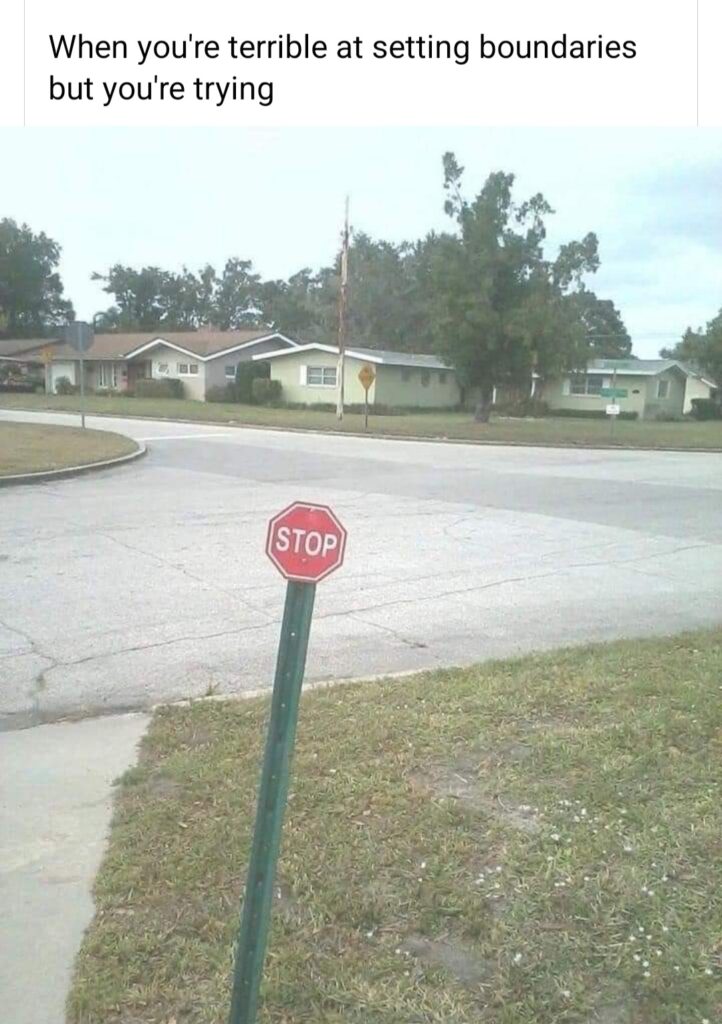
If you throw a frog into a pot of boiling hot water, she will jump out straight away, but if you put her into a pot of water and slowly raise the temperature, she will stay in that water until she is cooked.
That’s how I felt, cooked! During the many years of my loved one’s addiction my boundaries diminished into thin air, or perhaps I didn’t understand the concept of boundaries even before that?
If you grew up in a home where no boundaries were set, or where people violated your boundaries, setting and maintaining boundaries might be difficult for you.
Fawn is a trauma response, the least recognized one (we are aware of flight, fight, and freeze) Fawn is a trauma response that becomes a coping mechanism of avoiding conflict, people pleasing, making yourself uncomfortable for others to feel comfortable, having no boundaries, being overwhelmed and co-dependent, agreeing to things to just keep the peace, to establish some sense of safety.
When we come from codependent dynamics, setting boundaries can feel confusing, terrifying, guilt ridden, and foreign, you just don’t know how to do it.
Yet, having no boundaries with your addicted loved one sets the stage for disaster. To help yourself and your loved one ,you need to have boundaries, you need to understand practice and set very clear boundaries, for your safety, and ultimately for him/her as well.
It is said that “if your addict is happy with you, you are helping him/her kill themselves, if your addict is angry with you, you are helping to save his/her life”.
“Daring to set boundaries is about having the courage to love ourselves even when we risk disappointing others” – Brene Brown
Boundaries are meant to protect us

Boundaries are part of self care, they are healthy, normal and necessary. They give us a sense of ourselves, defines our world, and keeps us safe.
Boundaries are personal fences, they don’t have to be electric fences (but can be), they can also be a consistent light around you that announces: I deserve to be treated with respect.
To keep people from coming into our personal space and taking advantage of us.
To keep us from going into the space of others and taking advantage of them.
To give each of us a way to represent our sense of who we are.
Set boundaries for your own wellbeing, not to control others.
How to set healthy boundaries
Clearly identify your boundary, understand why you need that boundary.
Think of what you do not want to see, hear, or do.
Decide on limits – what you will and will not tolerate.
Be straight forward and clear about what you want. Use a calm and polite tone.
Don’t apologize or give explanations, NO is a full sentence, it’s ok to be assertive.
Start with tighter boundaries (and then loosen up if appropriate).
Address boundary violation early, decide on an action should they be violated.
Expect resistance in the beginning and don’t let it deter you, remember that setting boundaries is an ongoing process.
Boundaries include action

Once you decide on your boundary, have an action planned, should it be violated, don’t choose something you will not be able to uphold, the action should be appropriate to the boundary that was broken.
“If this continues, I won’t be spending time with you”
“If you cannot respect what I’m asking, I will need space before we can continue this conversation”
“I’m not going to listen to you if you speak to me like that”
“If you continue to pressure me or attempt to guilt me, I am going to have to end this conversation”
“If you use drugs again, I will not be able to let you stay
“If you go out drinking, you can’t be in my space”
“I will support you 100% in recovery but if you choose to continue abusing substances you can’t be here”
Boundaries sound like:

“I understand you are angry, but you do not speak to me that way”
“I’m sorry, but I can’t help you this time”
“I don’t feel safe, so I am going to leave”
“I don’t give you permission to do…”
“I would appreciate you not bringing this up anymore”
“I am allowed to change my mind”
“I won’t be able to make it”
“I need time to think about this and I will get back to you later”
“If you text me, I’ll text back at a time that works best for me”
Signs that your boundaries are being violated
When someone says something which goes beyond your comfort zone …
You feel angry (especially if you don’t know why) or resentful
You feel hot and flushed
You feel overwhelmed, drained or smothered
You get irritated by sound or movement
Trust your intuition

Setting boundaries is not selfish, it sets the tone for healthy relationships, it’s important for your wellbeing.
Learn to trust yourself, to put your peace, comfort and sanity as your priority.
If something feels wrong, it is wrong.
If you are not sure, trust your intuition, your gut feelings will guide you.
Always trust your gut. Your brain can be fooled, your heart is an idiot, but your gut doesn’t know how to lie.

